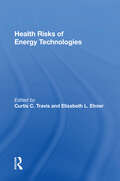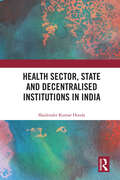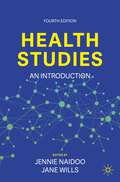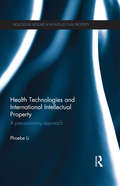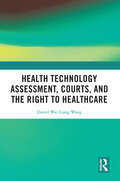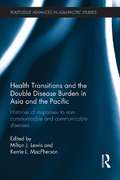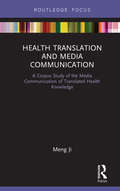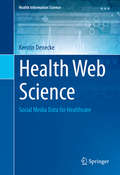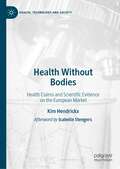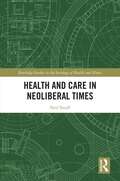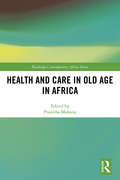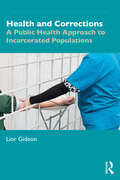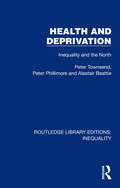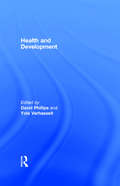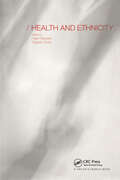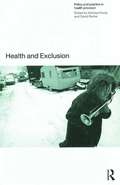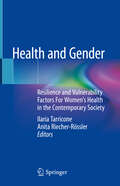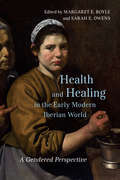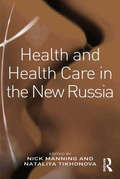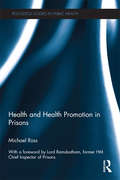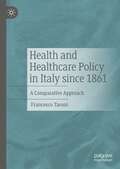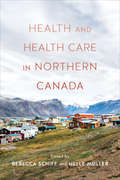- Table View
- List View
Health Rights Are Civil Rights: Peace and Justice Activism in Los Angeles, 1963–1978
by Jenna M. LoydHealth Rights Are Civil Rights tells the story of the important place of health in struggles for social change in Los Angeles in the 1960s and 1970s. Jenna M. Loyd describes how Black freedom, antiwar, welfare rights, and women&’s movement activists formed alliances to battle oppressive health systems and structural violence, working to establish the principle that health is a right. For a time—with President Nixon, big business, and organized labor in agreement on national health insurance—even universal health care seemed a real possibility.Health Rights Are Civil Rights documents what many Los Angeles activists recognized: that militarization was in part responsible for the inequalities in American cities. This challenging new reading of suburban white flight explores how racial conflicts transpired across a Southland landscape shaped by defense spending. While the war in Vietnam constrained social spending, the New Right gained strength by seizing on the racialized and gendered politics of urban crisis to resist urban reinvestment and social programs. Recapturing a little-known current of the era&’s activism, Loyd uses an intersectional approach to show why this diverse group of activists believed that democratic health care and ending war making were essential to create cities of freedom, peace, and social justice—a vision that goes unanswered still today.
Health Risks Of Energy Technologies
by Curtis TravisThis text examines occupational, public health, and environmental risks of the coal fuel cycle, the nuclear fuel cycle, and unconventional energy technologies. Includes detailed coverage of the relationship between energy economics and risk analysis, assessing the problems of applying traditional cost-benefit analysis to long-term environmental problems (such as global carbon dioxide levels), questions about the public's perception and acceptance of risk, global risks associated with current and proposed levels of energy production and consumption from all major sources.
Health Sector, State and Decentralised Institutions in India
by Shailender Kumar HoodaThis book describes the transition in Indian healthcare system since independence and contributes to the ongoing debate within development and institutional economics on the approaches towards reform in the public health system. The institutional reform perspective focuses on examining the effective utilisation of allotted resources and improvements in delivery through decentralisation in governance by ensuring higher participation of elected governments and local communities in politics, policymaking and delivery of health services. It discusses the economic (resource) reforms to explain the relevance and expansion of state interventionism along with its influence on the health sector, accountability and allocative efficiency. The author also explores the connections between neoliberal thought and privatisation in health sector, and examines the greater role of insurance-based financing and their implications for health service access and delivery. The book offers ways to address long-standing systemic and structural problems that confront the Indian healthcare system. Based on large-scale surveys and diverse empirical data on the Indian economy, this book will be of great interest to researchers, students and teachers of health economics, governance and institutional economics, political economy, sociology, public policy, regional studies and development studies. This will be useful to policymakers, health economists, social scientists, public health experts and professionals, and government and nongovernment institutions.
Health Studies: An Introduction
by Jane Wills Jennie NaidooThis new edition of Health Studies provides an authoritative and contemporary introduction to the study of health. With chapters including epidemiology, psychology, human and environmental geography, and anthropology, it is the only book to explore in one volume all of the core disciplines that contribute to understanding health. It illustrates how the complexity of health problems such as obesity should be viewed with an interdisciplinary perspective. Each chapter explains the disciplinary approach and then its theoretical and research approaches with examples. A highlight of this 4th edition is a new chapter on sports and exercise science providing another scientific chapter on physiology which is applied and will be of interest to all those thinking of employment in sports or leisure industry.The book is accessible and learner-centered and each chapter features: a connections feature that links the chapters together; learning tasks; questions for reflection and debate; examples to illustrate concepts, methodologies and to explore contemporary issues; a case study on obesity, food and diet.Comprehensive, accessible and written by leading experts in the different fields, this is the introductory text for all students of health studies.
Health Technologies and International Intellectual Property Law: A Precautionary Approach (Routledge Research in Intellectual Property)
by Phoebe LiThe global transmission of infectious diseases has fuelled the need for a more developed legal framework in international public health to provide prompt and specific guidance during a large-scale emergency. This book develops a means for States to take advantage of the flexibilities of compulsory licensing in the Agreement on Trade-Related Aspects of Intellectual Property Rights (TRIPS), which promotes access to medicines in a public health emergency. It presents the precautionary approach (PA) and the structure of risk analysis as a means to build a workable reading of TRIPS and to help States embody the flexibilities of intellectual property (IP). The work investigates the complementary roles of the World Health Organization (WHO) and the World Trade Organization (WTO) in order to promote the harmonisation of the precautionary approach in relation to the patenting of crucial pharmaceutical products. By bringing together international trade law and intellectual property law Phoebe Li demonstrates how through the use of risk analysis and the precautionary approach, States can still comply with their legal obligations in international law, while exercising their sovereignty right in issuing a compulsory licence of a drug patent in an uncertain public health emergency. This book will be of great interest to students and academics of medical and healthcare law, intellectual property law, international trade law, and human rights law.
Health Technology Assessment, Courts and the Right to Healthcare
by Daniel Wei WangBoth developing and developed countries face an increasing mismatch between what patients expect to receive from healthcare and what the public healthcare systems can afford to provide. Where there has been a growing recognition of the entitlement to receive healthcare, the frustrated expectations with regards to the level of provision has led to lawsuits challenging the denial of funding for health treatments by public health systems. This book analyses the impact of courts and litigation on the way health systems set priorities and make rationing decisions. In particular, it focuses on how the judicial protection of the right to healthcare can impact the institutionalization, functioning and centrality of Health Technology Assessment (HTA) for decisions about the funding of treatment. Based on the case study of three jurisdictions – Brazil, Colombia, and England – it shows that courts can be a key driver for the institutionalization of HTA. These case studies show the paradoxes of judicial control, which can promote accountability and impair it, demand administrative competence and undermine bureaucratic capacities. The case studies offer a nuanced and evidence-informed understanding of these paradoxes in the context of health care by showing how the judicial control of priority-setting decisions in health care can be used to require and control an explicit scheme for health technology assessment, but can also limit and circumvent it. It will be essential for those researching Medical Law and Healthcare Policy, Human Rights Law, and Social Rights.
Health Transitions and the Double Disease Burden in Asia and the Pacific: Histories of Responses to Non-Communicable and Communicable Diseases (Routledge Advances in Asia-Pacific Studies)
by Milton J. Lewis Kerrie L. MacPhersonChronic diseases—cardiovascular disease, cancer, chronic respiratory disease and diabetes—are not only the principal cause of world-wide mortality but also are now responsible for a striking increase in the percentage of sickness in developing countries still grappling with the acute problems of infectious diseases. This "double disease burden" poses demanding questions concerning the organisation of health care, allocation of scarce resources and strategies for disease prevention, control and treatment; and it threatens not only improvement in health status but economic development in the many poorer countries of the Asia Pacific region. This book presents an historical account of the development of the double disease burden in Asia and the Pacific, a region which has experienced great economic, social, demographic and political change. With in-depth analysis of more than fifteen countries, this volume examines the impact of the double disease burden on health care regimes, resource allocation, strategies for prevention and control on the wealthiest nations in the region, as well as the smallest Pacific islands. In doing so, the contributors to this book elaborate on the notion of the double disease burden as discussed by epidemiologists, and present real policy responses, whilst demonstrating how vital health is to economic development. Health Transitions and the Double Disease Burden in Asia and the Pacific will be of great value to both scholars and policy makers in the fields of public health, the history of medicine, as well as to those with a wider interest in the Asia-Pacific region.
Health Translation and Media Communication: A Corpus Study of the Media Communication of Translated Health Knowledge (Routledge Studies in Empirical Translation and Multilingual Communication)
by Meng JiCross-sectoral interaction and cooperation in the communication of nutritional health risks represents a strategic research area among national governments and international health authorities. The key research question this book addresses is whether and how different industrial sectors interact with each other in the communication and industrial utilisation of health research findings. Through the introduction and exploration of large-scale industry news and digital media resources, this book systematically analyses a range of digital news genres and identifies new and growing trends of inter-sectoral interaction around the communication of nutritional health in the Chinese language at both international and national levels. This book argues that cross-sectoral interaction can be explored to identify areas that require policy intervention to increase the efficiency and effectiveness of current health communication and promotion. Inter-sectoral interaction can also provide incentives to develop new social programmes and business models to innovate and transform traditional industrial sectors.
Health Web Science
by Kerstin DeneckeThis book introduces the field of Health Web Science and presents methods for information gathering from written social media data. It explores the availability and utility of the personal medical information shared on social media platforms and determines ways to apply this largely untapped information source to healthcare systems and public health monitoring. Introducing an innovative concept for integrating social media data with clinical data, it addresses the crucial aspect of combining experiential data from social media with clinical evidence, and explores how the variety of available social media content can be analyzed and implemented. The book tackles a range of topics including social media's role in healthcare, the gathering of shared information, and the integration of clinical and social media data. Application examples of social media for health monitoring, along with its usage in patient treatment are also provided. The book also considers the ethical and legal issues of gathering and utilizing social media data, along with the risks and challenges that must be considered when integrating social media data into healthcare choices. With an increased interest internationally in E-Health, Health 2. 0, Medicine 2. 0 and the recent birth of the discipline of Web Science, this book will be a valuable resource for researchers and practitioners investigating this emerging topic.
Health Without Bodies: Health Claims and Scientific Evidence on the European Market (Health, Technology and Society)
by Kim HendrickxHealth Without Bodies invites readers on an ethnographic exploration of the boundary between food and medicine. Food-related health claims are governed in the EU as voluntary statements on food labels to help consumers make ‘informed choices’. This poses an interesting problem: when claims refer to health, one can no longer ignore that consumers have bodies. Asking how these claims have become possible as a new kind of truth-statement on the market, this book reveals the contours of a fundamental tension between what is expected from consumers in a liberal market economy, and how food and the body come to trouble those expectations. In doing so, it illuminates why the difference between food and medicine is such a sensitive issue, and why seemingly trivial health claims have been subject to so much debate and political control.
Health and Care in Neoliberal Times
by NEIL SMALLThis book argues that neoliberal changes in health and social care go beyond resource allocations, priority setting and privatisation, and manifest in an invidious erosion of the quality of our social relationships, including relationships between care provider and care recipient. Critically examining the concept of culture and why shifts in what is considered "acceptable practice" happen, the book explores the conduct of conduct. It draws together what we know about neoliberalism’s impact on the economy and public services with research around governmentality and social change. Looking at breakdowns in the quality of care in the NHS and social care across a range of settings it holds that macro influences, such as austerity and marketisation, cannot explain everything and many of the damaging things that go on in care breakdowns occur in micro-interactions between care provider and care recipient. Analysing the interactions between the calculations of political centres, the strength of professional identities, the effectiveness of oversight and supervision and the biographies of protagonists, Neil Small problematises the focus on culture, and culture change, in our response to care failures and examines what a different approach to care might involve. Exploring the interaction of politics, economics and social change and their impact on health care and the wider welfare state, this is an important contribution for students and researchers in health and social care, sociology, political science and management studies.
Health and Care in Old Age in Africa (Routledge Contemporary Africa)
by Pranitha MaharajThis book explores health and care of the older population in Africa, focusing on policy and programmatic responses, gaps and future challenges related to health and care across the continent. The first part of the book sets the scene for the volume, profiling the demographic and health situation of the elderly in Africa. It also provides an overview of the various models of care in Africa, looking in particular at the family care model, which constitutes the main source of support for the elderly in Africa. Part 2 provides case studies from across the continent to explore varying forms of elder care as well as the health challenges facing the elderly in the different contexts. The final part considers key aspects related to older person’s experience of social pensions, which are widely recognised as a potentially powerful strategy of meeting the needs of older persons.. Identifying lessons regarding African-centric models of care, as well as reflections on the structural and policy challenges that are likely to confront countries across the continent as they strive to meet the specific needs of increasingly ageing populations, this book will be of interest to scholars of health and social care of the elderly.
Health and Corrections: A Public Health Approach to Incarcerated Populations
by Lior GideonPutting forward a new approach to the study of corrections, this book draws together public health and corrections and explores the importance of this nexus.Presenting a theoretical overview of relevant sociological and public health theories, the book introduces basic concepts, terminology, analytical frameworks, and theories, covering major issues in the domain of public health, public safety, and criminal justice. Addressing incarcerated population health needs in correctional setting, it provides an accessible and panoramic overview of the policy impact of laws on the health of incarcerated individuals. In doing so, the book investigates a variety of topics, including preincarceration and prison-generated trauma, chronic health issues, contagious infectious diseases, and aging in the system. The focus is on four “special-needs populations”: (1) women’s health; (2) mental illness among inmates; (3) elderly and geriatric inmates; and (4) substance abusing inmates. Giving an organizational perspective to the topic of health and corrections, the book also considers violence, public health in the community, access to health services by marginalized individuals, and why it matters to discuss health in prisons, the living conditions in prison, health management, and the health and well-being of those engaged with incarcerated individuals.Health and Corrections aims to generate an important discussion on the nexus of health and justice and will be a valuable resource for students, researchers, and instructors, as well as for professionals in the field of corrections, criminal justice, and public health and safety.
Health and Deprivation: Inequality and the North (Routledge Library Editions: Inequality #8)
by Peter Phillimore Peter Townsend Alastair BeattieWhen originally published in 1988, this book presented new evidence of inequalities in health found among communities in different areas of the North of England. It relates this evidence to long-term trends taking place in patterns of health in Britain as a whole and explores how far health inequalities can be explained by variations in material deprivation. The book provides a detailed examination of the correlation between health and wealth, or ill-health and deprivation in Britain in the 20th century but the book has an enduring relevance as the Covid Pandemic has once again shown that regional disparities in wealth have profound outcomes for health. The book is of significance for health professionals, social services and those planner and politicians concerned with levelling up.
Health and Development (Longman Development Studies)
by David R. Phillips Yola VerhasseltHealth and Development presents a broad and detailed description of the multifaceted aspects of health and development across the globe. People are living longer, their lifestyles are changing and so too are the diseases from which they suffer. Recession in the North and debt servicing in the South have reduced public expenditure on health and welfare. The links between regional, economic and environmental factors and the health of a population are becoming clearer. Does development mean a longer life of lower quality? Always alive to both the global and the local implications, the authors focus in particular on the critical issues surrounding environmental impact, the interaction of poverty and health, socio-cultural factors in HIV/AIDS transmission, the use of traditional and community health care resources and women's health.
Health and Education in Early Childhood
by Arthur J. Reynolds Arthur J. Rolnick Judy A. Temple Arthur J. Reynolds Arthur J. RolnickHealth and Education in Early Childhood presents conceptual issues, research findings, and program and policy implications in promoting well-being in health and education in the first five years of life. Leading researchers in the multidisciplinary fields of early learning and human capital formation explore the themes of the integration of health and education in promoting young children's well-being; the timing of influences on child development; and the focus on multiple levels of strategies to promote healthy early development. Through this, a unique framework is provided to better understand how early childhood health and education predictors and interventions contribute to well-being at individual, family community, and societal levels and to policy development. Key topics addressed in the chapters include nutritional status, parenting, cognitive development and school readiness, conduct problems and antisocial behavior, obesity, and well-being in later childhood and adulthood.
Health and Ethnicity
by Prakash Shetty Helen MacbethIn modern multicultural societies, the topic of 'health and ethnicity' has become increasingly recognised as highly relevant. All too frequently, academic coverage of the topic has been scattered in specialist literature of different disciplines; a book bringing these perspectives together has so far been lacking.The aim of the book is to explain the diversity in health experience due to determinants and factors that can be described as 'ethnic'. Both 'ethnicity' and 'health' are words that have stimulated semantic debate, and yet too seldom is sufficient sensitivity given over to the complexity of the issue.
Health and Exclusion: Policy and Practice in Health Provision
by David Banks Michael PurdyHealth and Exclusion is a pioneering examination of those policies and practices of exclusion currently experienced by health 'customers' in the UK. Chapters document examples of exclusion in a number of controversial areas, including: *the impact of poverty on the health of children *exclusion in maternity care *exclusion of those with mental health problems *exclusion of the elderly in health care *the silenced voice of the patient *barriers to recruitment and advancement within the health professions. The authors challenge whether New Labour policies sufficiently address the inequalities in health experienced by some sectors of society. Moreover they suggest that health professionals at times actively contribute to exclusion and suggest strategies and practices to combat marginalisation and resist exclusion.
Health and Gender: Resilience and Vulnerability Factors For Women's Health in the Contemporary Society
by Anita Riecher-Rössler Ilaria TarriconeThis book presents a concise and comprehensive overview of the most important protective and risk factors for women's health, and reviews the main areas of medical science from a gender perspective. Numerous scientific experiments and studies have shown how gender differences significantly affect the clinical presentation of physical and mental health disorders as well as responses to treatments. This text highlights these issues, while at the same time reflecting on the practical implications of the theoretical knowledge presented. It also examines the organization of social and health services, which should increasingly take into account the specificities related to gender differences and where equality is based on truly embracing these differences. The final part provides insights into the experiences and testimonies collected by the authors of the book. Written by a multidisciplinary team of medical, psychosocial and humanities professionals, this book is of interest to health professionals and medical students.
Health and Girlhood in Britain, 1874-1920
by Hilary MarlandThis first major study of girls' health in modern Britain explores how debates and advice on healthy girlhood shaped ideas about the lives of young women from the 1870s to the 1920s, as theories concerning the biological limitations of female adolescence were challenged and girls moved into new arenas in the workplace, sport and recreation.
Health and Healing in the Early Modern Iberian World: A Gendered Perspective (Toronto Iberic)
by Sarah E. Owens Margaret E. BoyleRecognizing the variety of health experiences across geographical borders, Health and Healing in the Early Modern Iberian World interrogates the concepts of "health" and "healing" between 1500 and 1800. Through an interdisciplinary approach to medical history, gender history, and the literature and culture of the early modern Atlantic World, this collection of essays points to the ways in which the practice of medicine, the delivery of healthcare, and the experiences of disease and health are gendered. The contributors explore how the medical profession sought to exert its power over patients, determining standards that impacted conceptions of self and body, and at the same time, how this influence was mediated. Using a range of sources, the essays reveal the multiple and sometimes contradictory ways that early modern health discourse intersected with gender and sexuality, as well as its ties to interconnected ethical, racial, and class-driven concerns. Health and Healing in the Early Modern Iberian World breaks new ground through its systematic focus on gender and sexuality as they relate to the delivery of healthcare, the practice of medicine, and the experiences of health and healing across early modern Spain and colonial Latin America.
Health and Health Care in the New Russia
by Nataliya TikhonovaThis volume explores the nature of health and health-care experiences in Russia by comparing societies and communities with different socio-cultural conditions. The unique use of longitudinal data collected over ten years, allows the authors to address key questions on Russians individual experiences of health care and their understanding of its influencing factors. They explore the methods of self treatment and illness prevention in combination with the effects poverty and treatment availability can have on the standards of living for the people surveyed. This pertinent issue follows a time of rapidly worsening health status amongst the Russian population and a grave decline in male life expectancy. The findings are set within the context of experience from Finland and the UK, allowing the authors to explore the challenge of the Russian health-care crisis to Western European models of health status and health care.
Health and Health Promotion in Prisons
by Michael RossThe impact of the United Nations "Healthy Prisons" initiative has highlighted the importance of health and health promotion in incarcerated populations. This invaluable book discusses the many health and medical issues that arise or are introduced into prisons from the perspective of both inmates and prison staff. Health and Health Promotion in Prison places key issues in prison healthcare into a historical perspective and investigates contemporary policy drivers. It then addresses the significant legal issues relating to health in prison settings and the human rights implications and questions that arise. The book presents a useful framework for health education in prison and a model for introducing structural, policy and health-related changes based on the UN Health in Prisons model, and also includes a special chapter on mental health issues. Providing a comprehensive and thought-provoking overview of health promotion issues in correctional environments, this is an essential reference for all those involved in prison healthcare.
Health and Healthcare Policy in Italy since 1861: A Comparative Approach
by Francesco TaroniProviding a historical overview of healthcare in Italy from its unification in 1861 to the present COVID-19 pandemic, this book analyses the political, social and cultural impact of Italian healthcare policy and medicine. The author examines the development of public health, hospitals, and primary care, and the building of healthcare systems across three political regimes in Italy: the liberal period (1861-1914), Fascism (1922-43), and the Italian Republic (1948 to the present day). By emphasising the embeddedness of health-related legislation in Italy’s political and social background, this book offers a comparative account of Italian health policy, and contrasts this with developments in neighbouring European countries, Canada and the United States. The book focuses on the Italian government’s reaction to the social and political impact of several diseases: pellagra; cholera; malaria; and tuberculosis, and explores the present-day response to the current COVID-19 pandemic. A timely and comprehensive read, this book will appeal to those teaching and researching Italian history and the history of medicine and healthcare more widely.
Health and Healthcare in Northern Canada
by Rebecca Schiff and Helle MøllerAccounting for almost two-thirds of the country’s land mass, northern Canada is a vast region, host to rich natural resources and a diverse cultural heritage shared across Indigenous and non-Indigenous residents. In this book, the authors analyse health and health care in northern Canada from a perspective that acknowledges the unique strengths, resilience, and innovation of northerners, while also addressing the challenges aggravated by contemporary manifestations of colonialism. Old and new forms of colonial programs and policies continue to create health and health care disparities in the North. Written by individuals who live in and study the region, Health and Health Care in Northern Canada utilizes case studies, interviews, photographs, and more, to highlight the lived experiences of northerners and the primary health issues that they face. In order to maintain resilience, improve the positive outcomes of health determinants, and diminish negative stereotypes, we must ensure that northerners – and their cultures, values, strengths, and leadership – are at the centre of the ongoing work to achieve social justice and health equity.

